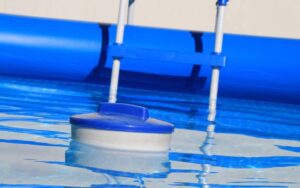As the world increasingly turns its attention to eco-friendly living, many of us reevaluate the environmental impact of our daily choices, including leisure activities like swimming. One aspect gaining attention is the concept of saltwater pools, a fresh take on the traditional chlorinated pools we’ve grown accustomed to.
In this article, we’ll dive into the world of saltwater pools, exploring how they work and whether they stand up to the eco-friendly promise. Whether you’re a seasoned pool owner or considering installing your first swimming pool, understanding the nuances of a salt pool system versus traditional chlorine pools can guide you toward more environmentally conscious decisions.
Our focus will ultimately be answering the question: Are saltwater pools a greener choice for your swimming experience?
Table of Contents
ToggleSaltwater Pools: What You Need to Know
When you hear “saltwater pool,” what comes to mind? Contrary to what some might think, it’s not like swimming in the ocean. Instead, saltwater pools offer a unique swimming experience, using a salt chlorine generator to maintain clean and clear water.
Unlike traditional chlorine pools, where chlorine is added directly as tablets or liquid, saltwater pools work differently. Here’s how:
In a saltwater pool, salt is added to the pool water. This salt, through electrolysis, is converted into free chlorine by the salt chlorine generator. This ingenious system means the harsh smells and burning eyes often associated with chlorinated pools are significantly reduced. Additionally, the salinity level in these pools is much lower than in seawater, making the water feel silkier and less abrasive on your skin.
For pool owners, this means enjoying the benefits of a chlorinated pool without the typical downsides, leading to a more pleasant swimming experience and less maintenance.
Environmental Impact of Salt Pools System
Exploring the environmental footprint of our leisure choices is crucial in today’s eco-conscious world. Regarding swimming pools, the debate often centers around saltwater versus conventional chlorine pools. Each has its unique impact on the environment, from chemical usage to energy consumption.
Chemical Usage in Saltwater vs. Traditional Chlorine Pool
When it comes to chemical usage, salt water and chlorine pools differ significantly:
Saltwater Pools: A salt chlorine generator converts salt into chlorine. This process reduces the need for additional chemicals, resulting in fewer chloramines, known for causing skin irritation and chlorine smell.
Conventional Chlorine Pool: Rely on manually added chlorine through tablets or liquid, often requiring additional chemicals to balance chlorine levels and combat algae.
Energy Consumption of Saltwater Pool Systems
Saltwater pools do require electricity to run the salt chlorine generators. This consumption can be higher compared to the energy used in traditional pool chlorination methods. However, the efficiency and longevity of modern salt systems can offset this difference over time.
Long-Term Sustainability: Saltwater Pools vs. Chlorine Pools

Evaluating long-term sustainability reveals some notable contrasts:
Saltwater Pools: They tend to have a softer feeling on the skin and are less environmentally harmful due to lower chemical use. These systems’ salt cells and other pool equipment often last longer, reducing waste.
Chlorine Pool: Due to corrosion and wear, it may require frequent chemical adjustments and more regular pool equipment replacement, leading to more waste and environmental impact.
Even though saltwater pools require electricity for the salt chlorine generator, their reduced chemical usage and longer-lasting equipment make them a potentially more sustainable choice for eco-conscious swimmers.
Saltwater Pools and the Wider Environment
When we consider the broader environmental implications of saltwater pools, two key aspects come to the forefront
- Water conservation and;
- The impact on local ecosystems and wildlife.
Saltwater Pool and Water Conservation
A saltwater pool, operated by a saltwater chlorine generator, can be more water-efficient than their chlorinated counterparts. How so? The salt system in these pools often requires less frequent water replacement due to the more stable chemical balance. It means that as a pool owner, you’re saving on chemicals and conserving water, an increasingly precious resource.
Impact on Local Ecosystems and Wildlife
The environmental footprint of a saltwater pool extends beyond just water use. Unlike pools treated with conventional chlorine, the runoff from a saltwater pool is less likely to contain high levels of harmful chemicals. This reduction in chemical pollutants is beneficial for local ecosystems, helping to protect wildlife and plant life in surrounding areas.
However, it’s important to note that while the salt levels in these pools are lower than in ocean water, care should still be taken to prevent saline water from adversely affecting nearby soil and vegetation.
Saltwater pool presents a more eco-friendly alternative, contributing to water conservation and reducing harmful chemical runoff, thereby safeguarding our precious ecosystems.
Making the Eco-Friendly Choice

Opting for an eco-friendly swimming pool means considering various factors and alternatives. If you’re leaning towards a saltwater pool, understanding these considerations is crucial for making an informed decision.
Factors to Consider Before Installing a Saltwater Pool
- Initial Cost: Assess the upfront investment required for a saltwater system, which can be higher than conventional chlorine pools.
- Maintenance Requirements: Understand the maintenance of a saltwater pool, including monitoring salt levels and caring for the saltwater chlorine generator.
- Energy Usage: Consider the electricity needed to run the salt chlorine generator, which impacts operational costs and environmental footprint.
- Water Conservation: Evaluate the water-saving advantages of a saltwater pool, as they typically require less frequent water replacement.
- Local Ecosystem Impact: Be mindful of how saltwater pool discharge might affect your local environment, especially if you live in an area with sensitive ecosystems.
Comparing Salt Water Pools to Other Eco-Friendly Pool Options
When comparing saltwater pools to other eco-friendly options, consider factors like using natural pools, which leverage plants and natural filtering processes, or pools that use UV or ozone purification systems. Each option has its unique environmental impacts and maintenance needs.
While a saltwater pool reduces chemical use and enhances water conservation, natural pools eliminate chemicals but require more space and maintenance. UV or ozone systems, meanwhile, offer effective sanitation with minimal chemical use but may have higher energy requirements.
These pools are indeed a greener option, but weighing them against other eco-friendly alternatives is important to find the best fit for your lifestyle and environmental goals.
Consulting Experts for Saltwater Pool Conversion
Before leaping to a saltwater pool, gathering all the facts is essential. Let’s recap the key points we’ve covered:
- Saltwater pools use a generator, reducing the need for added chemicals.
- They typically require less frequent water replacement, aiding in water conservation.
- The energy consumption for salt systems is balanced by reduced chemical use and maintenance.
- They are generally gentler on the environment and local ecosystems than a chlorinated pool.
In conclusion, while saltwater pools offer several eco-friendly advantages, including reduced chemical usage and less impact on local ecosystems, they still need to be considered, such as energy use and initial installation costs.
Consulting with professionals like Professional Aquatic Services can provide valuable insights if you consider converting your pool to a saltwater system. They specialize in pool saltwater conversions, ensuring your transition to a more eco-friendly pool is smooth, efficient, and tailored to your needs.
Remember, the best choice is an informed choice, especially when embracing eco-friendly living with saltwater pools.

